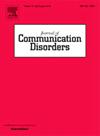失语症中的阅读:在失语症支持中心支持参与和享受阅读
IF 2.1
3区 医学
Q2 AUDIOLOGY & SPEECH-LANGUAGE PATHOLOGY
引用次数: 0
摘要
失语症患者通常在阅读方面有困难。在文献中,有少量关于失语症患者专门读书俱乐部的报道,为失语症患者提供了一种社交活动,让他们在一个支持性的环境中重新与阅读联系起来。本文描述了一项探索性研究,探讨如何在失语症支持中心支持失语症患者参与和享受阅读。这项研究包括两个阶段。在第一阶段,一个焦点小组探讨失语症患者的阅读和对社交阅读活动的偏好。在第二阶段,支持中心提供了一个反映焦点小组共同偏好的小说阅读小组。焦点小组揭示了中风前和中风后阅读的个体差异。人们有动力去阅读,但却发现这很费力。参与者对社交阅读活动感兴趣,但由于阅读偏好、能力和阅读所需的努力不同,他们觉得读书俱乐部不可行。小说阅读小组的目的是让个人在一个支持和鼓励的环境中分享他们在家里读过的东西。这种形式让每个人都参与进来,参与者报告说他们的阅读能力得到了提高。这种社交阅读活动鼓励人们阅读自己的阅读材料,而不是共享的书籍,允许考虑个人偏好和适应不同的阅读能力水平。个人不需要阅读相同的阅读材料就能从分享阅读经验中受益。本文章由计算机程序翻译,如有差异,请以英文原文为准。
Reading in aphasia: Supporting engagement in and enjoyment of reading in an aphasia support centre
People with aphasia often experience difficulties with reading. Within the literature, there are a small number of reports of dedicated book clubs for people with aphasia, providing a social activity for individuals to reconnect with reading in a supportive environment. This paper describes an exploratory study investigating how to support people with aphasia's engagement and enjoyment of reading in an aphasia support centre. The study consisted of two phases. In phase 1, a focus group explored people with aphasia's reading and preferences about social reading activities. In phase 2, a novel reading group that reflected the preferences shared within the focus group was offered in the support centre.
The focus group revealed individual variability in both pre- and post-stroke reading. People were motivated to read but found it effortful. Participants were interested in a social reading activity but felt a book club was not feasible due to differences in reading preferences, ability, and the effort required to read. The novel reading group was designed to allow individuals to share what they had read at home in a supportive and encouraging environment. The format allowed everyone to engage and participants reported improved reading. This social reading activity encouraged people to read their own reading material rather than a shared book, allowing consideration of personal preference and accommodation of different levels of reading ability. Individuals did not need to read the same reading material to benefit from sharing the experience of reading.
求助全文
通过发布文献求助,成功后即可免费获取论文全文。
去求助
来源期刊

Journal of Communication Disorders
AUDIOLOGY & SPEECH-LANGUAGE PATHOLOGY-REHABILITATION
CiteScore
3.30
自引率
5.90%
发文量
71
审稿时长
>12 weeks
期刊介绍:
The Journal of Communication Disorders publishes original articles on topics related to disorders of speech, language and hearing. Authors are encouraged to submit reports of experimental or descriptive investigations (research articles), review articles, tutorials or discussion papers, or letters to the editor ("short communications"). Please note that we do not accept case studies unless they conform to the principles of single-subject experimental design. Special issues are published periodically on timely and clinically relevant topics.
 求助内容:
求助内容: 应助结果提醒方式:
应助结果提醒方式:


